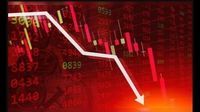Asian stocks and U.S. futures fell sharply on April 8, 2025, as investors braced for the implementation of President Donald Trump's sweeping tariffs set to take effect just after midnight on April 9. The turbulence in the markets reflected growing anxiety over the escalating trade tensions between the U.S. and China, with the S&P 500 hovering dangerously close to a bear market.
On Tuesday, futures for the S&P 500 dropped more than 1.8%, while the Dow Jones Industrial Average futures fell by 469 points, or 1.2%. The Nasdaq-100 futures were down by 1.8%, and S&P 500 futures pulled back by 1.5%. The volatility continued a four-day rout, with the S&P 500 experiencing a 12% loss over that period, and the Dow losing over 4,500 points.
Tech giant Apple was particularly hard hit, with shares dropping nearly 23% in just four days, marking its worst performance since October 2000. Investors are concerned about the potential for higher costs due to the tariffs on imports from China, which are expected to include a staggering 104% levy on certain goods. The tariffs will apply to imports from 86 nations, igniting fears of retaliatory measures.
Canada has already announced plans for 25% retaliatory tariffs on U.S.-made vehicles, effective after midnight on April 9. This move is part of a broader response from several countries, which are poised to strike back against the U.S. tariffs.
As markets reacted to these developments, the broader MSCI Asia Pacific Index fell by 1.3%. South Korea's Kospi index dropped more than 1% in early trading on April 9, pushing its losses since July 11, 2024, to over 20%. The Korean won also declined, hitting its lowest point since the global financial crisis, trading at 1487.45 per dollar.
In Japan, the Nikkei 225 lost 3.14% at the open, while the Topix index fell 3.26%. The small-cap Kosdaq dropped 0.44%. Investors across Asia are bracing for the impact of the U.S. tariffs, which are set to affect a wide range of goods.
Oil prices also extended their selloff, falling more than 2% in early trading on April 9, closing below $60 a barrel for the first time since 2021. The uncertainty in the oil market reflects broader concerns about global economic growth amid rising trade tensions.
In the U.S., President Trump took to social media to assert that China wants to make a deal, stating, "We are waiting for China’s call. It will happen!" He also mentioned a "great call" with the acting President of South Korea, suggesting that discussions are ongoing.
Analysts have expressed mixed feelings about the future of tariffs. Piper Sandler analyst Andy Laperriere noted, "Our base case is tariffs will, over time, drift lower than today's level but stay off the charts – at the highest levels of our lifetimes. They are more likely to go higher in the near-term, though there could be some deals (probably minor ones) in the near term, too." This sentiment reflects the uncertainty surrounding the trade landscape as tariffs are enacted.
As the markets opened on April 9, futures were already showing signs of extended losses, with Dow futures down over 550 points, S&P 500 futures down 90 points, and Nasdaq futures down close to 350 points. The yield on 10-year Treasuries also advanced 11 basis points to 4.29% as investors sought safer assets amid the turbulence.
With the Federal Reserve's meeting minutes due for release on the same day, investors will be closely monitoring any signals regarding monetary policy, particularly in light of the economic pressures stemming from the tariffs. The ongoing tensions and uncertainty surrounding the trade policies are likely to keep investors on edge as the situation develops.
The fallout from these tariffs is expected to reverberate through the global economy, affecting not just the U.S. and China, but also countries that rely heavily on trade with both nations. As the situation unfolds, market participants will be watching closely for any signs of resolution or further escalation.
In summary, the financial markets are bracing for a tumultuous period as President Trump's tariffs take effect, with implications that could extend far beyond immediate stock market reactions. Investors are left to navigate a landscape fraught with uncertainty as they await the next developments in this ongoing trade saga.





